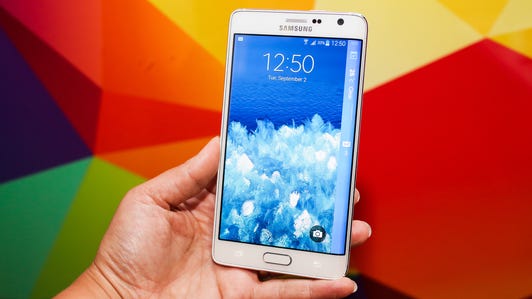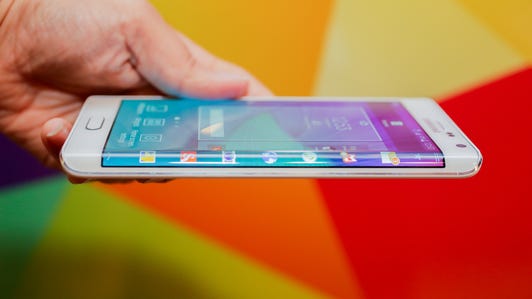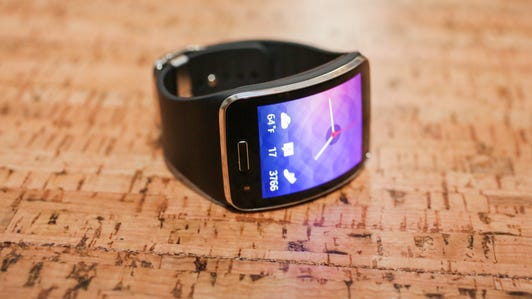
Sarah Tew/CNET
Samsung on Wednesday posted its fifth consecutive year-over-year decline in quarterly operating profits. And a big reason for that drop was the poor performance of its mobile business.
The South Korean company’s IT and mobile communications division recorded a 64 percent drop in fourth-quarter operating profit from the year-ago period, to 2 trillion won ($1.8 billion). Only 37 percent of Samsung’s operating profits came from its IT and mobile communications business in the December quarter compared with two-thirds a year earlier.
The drop underscores the continued pressures facing the smartphone king. Samsung has been struggling to compete against Apple in the high-end phone market and against newcomers such as Xiaomi at the low end. Apple in particular has become a bigger threat with its larger-screen devices, the 4.7-inch iPhone 6 and the 5.5-inch iPhone 6 Plus. Simply wanting a bigger display is no longer a reason to buy Samsung’s devices, and its smartphones can’t reach the low prices of those from Chinese and Indian vendors.
Apple tied with Samsung for the title of world’s biggest smartphone vendor in the fourth quarter, according to research firm Strategy Analytics. Apple’s share of the global smartphone market grew to 20 percent from 18 percent a year earlier, while Samsung’s hold on the market tumbled to 20 percent from 30 percent.
Here’s what we learned about Samsung’s mobile business from its earnings conference call, based on a transcript translated by Thomson Reuters.
Apple is eating Samsung’s lunch in mobile
Samsung now shares the title for world’s biggest smartphone maker with Apple, and it’s easy to see why from their December quarter results. Apple’s revenue from the iPhone jumped 57 percent in the quarter, while Samsung’s mobile-business revenue tumbled 23 percent.
See also
- Samsung’s smartphone woes continue with Q4 profit drop
- CNET’s take on the Galaxy Note Edge
- Seven things we learned from Apple’s Q1 earnings call
The South Korean company shipped 95 million handsets, which includes smartphones and feature phones. It didn’t break out how many of those were smartphones but said the portion was in the “high 70 percent” range. Strategy Analytics estimated Samsung shipped 74.5 million smartphones during the period, which would equate to 78 percent of the handset total. Apple, which has a much more limited product line, also shipped 74.5 million smartphones in the December quarter on booming demand for the iPhone 6 and 6 Plus.
Though the two companies shipped the same number of smartphones, they didn’t make the same amount of money from each device. Apple sells only pricey iPhones, while Samsung sells feature phones and cheap smartphones in emerging markets, resulting in a substantial gap between the two companies’ average selling prices, or ASPs. Samsung reported that the ASP for its handsets was about $200. That was less than a third of the $687 ASP for Apple’s smartphones.
In terms of tablets, Samsung shipped only about half as many as Apple (11 million Samsung tablets versus 21.4 million iPads).
Samsung hopes to reinvigorate its mobile business this year by introducing new phone designs and cheaper devices with better specifications. It has launched metal handsets — which many people had been requesting over its typical all-plastic designs — and this month started selling the first phone based on its Tizen operating system in India. The company also said it planned to cut the number of smartphone models it produces this year by 25 percent to 30 percent.
Samsung Galaxy Note Edge rocks a curved sidebar screen (hands-on pictures)






+17 more
“For our IM [IT and mobile communications] business, which had weak earnings in 2014, we will focus on the recovery of earnings by differentiating products with new materials and designs and by efficiently managing costs through various measures including streamlining product lineups,” said Robert Yi, Samsung’s head of investor relations.
He added that Samsung expects to ship more handsets in the current quarter and that a higher portion (low 80 percent range) should be smartphones. That in turn will boost Samsung’s handset ASP, but the company also expects tablet volumes to decline.
2015 will still be tough for Samsung
Samsung expects most of its businesses to improve over the next year, but the general environment will “be as challenging as that of 2014,” Yi said. Samsung also expects competition in smartphones to grow even more intense.
“We still face global macroeconomic uncertainties due to economic recession in the Eurozone, financial risks in emerging countries from collapse of oil prices, and a possible increase in key interest rates in the United States,” Yi said. “Also, from business perspectives, we expect intensifying product and price competition as well as an increasing level of difficulty for developing new technologies.”
For smartphones specifically, Samsung expects sales to improve as it introduces new devices with slimmer designs and flexible displays. It also expects the expansion of 4G LTE across the globe and increased importance in emerging markets to help its results, said Jin-Young Park, vice president of Samsung’s mobile business. The company is widely expected to unveil its Galaxy S6 smartphone at Mobile World Congress in Barcelona in early March.
“With our competitive new product lineup, we will actively increase our smartphone sales,” Park said. “Regarding the premium smartphones, we are preparing differentiated and innovative products with specialized features. In terms of our midrange products, we aim to further strengthen our market leadership by enhancing product capabilities in our new portfolio.”
Samsung will launch more devices with flexible displays and metal cases
Samsung is counting on flexible displays and metal frames/bodies to boost its smartphone sales. The Galaxy Note Edge, released late last year, features a screen that curves around one side of the device, while the company’s Galaxy A3 and A5 phones feature metal frames instead of plastic as in most of Samsung’s earlier devices. Even more of its products this year will include the new features, and many market watchers expect the Galaxy S6 to incorporate both and possibly be fully metal, not just rimmed in metal like the Galaxy A series.


Now playing:
Watch this:
New rumors point to an all-glass Samsung Galaxy S6
4:41
A Samsung executive (unnamed in the transcript) said he couldn’t gauge what percentage of Samsung’s phone lineup will use metal but said it will be more than in the past (which won’t be tough to accomplish since most of Samsung’s devices use plastic). Samsung also has worked on lining up enough suppliers — both within Samsung and outside — to make sure it has enough metal material for its devices.
And Samsung plans to start operating a new production facility for flexible displays in the second quarter, according to an executive from the company’s display business. And that means the company won’t have trouble building enough flexible displays for its devices.
“Currently we do not see any issues in meeting the customers’ demand using this current line until the new flexible display line goes into operation,” the executive said. “Regarding whether we will have sufficient capacity going forward, we do think that with the new flexible line operational within Q2 we will be able to actively respond and satisfy the new demand that we will have from the customers for these flexible displays.”
Big changes could be ahead for the chips used in Samsung’s smartphones
News broke last week that Samsung was planning to dump Qualcomm’s processor from its next Galaxy S flagship smartphone and use its own Exynos chips instead. Though neither company has explicitly confirmed the move, Qualcomm acknowledged Wednesday that it expects a large customer to not use its new Snapdragon 810 chip in its upcoming flagship device.
Qualcomm’s report likely means the Galaxy S6 won’t use an 810 processor, but it’s not yet clear whether Qualcomm will end up with a second-place prize by getting its modem chip in the phone instead. Samsung executives wouldn’t confirm anything during the earnings call, but they did raise suspicions that Samsung’s internal modem chips may be used in the Galaxy S6. They noted Samsung’s processors are being qualified by carriers, which means the chips will be certified to work on the wireless networks.
“Please understand it’s difficult for us to disclose facts pertaining to specific companies,” a Samsung executive said. “But…currently we are in the process of going through qualification with several carriers around the world.”
Samsung told CNET a year ago that it had started building its own standalone modem chip and that it was working on making chips that integrate an applications processor with a cellular chip. Having an integrated chip typically allows for better battery life and enables less-expensive devices, and Qualcomm currently dominates that market with its Snapdragon processors. Some Samsung rumor sites have speculated the Galaxy S6 will include Samsung’s in-house modem and applications processor.
Qualcomm declined to comment Thursday.
Samsung Galaxy Gear S






+24 more



